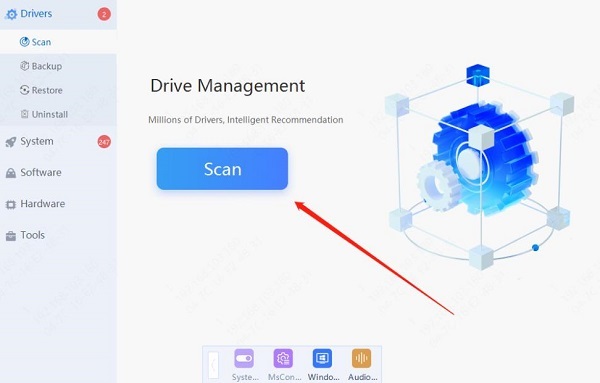
When we insert a USB drive into a computer, it may sometimes fail to be recognized or read. This article provides several common troubleshooting methods to help you quickly resolve the issue.
1. Check Hardware Connections
Try plugging the USB drive into different USB ports to rule out port issues.
Connect other USB devices (like a mouse or keyboard) to the same port to see if they work. If they don't, the USB port might be faulty.
Check the USB drive for physical damage, such as bending or loose connections, which can cause reading failures.
2. Update USB Drivers
Outdated or corrupted USB drivers may prevent the system from recognizing the drive. Updating the drivers can solve this issue. It's recommended to use Driver Sentry to automatically detect and update drivers, saving time and avoiding errors.
Download the latest version of Driver Sentry, install and open the software, and click "Scan".

After scanning, it will display the drivers that need updating. Find the USB driver in the list and click "Update".
After the update, restart your computer to ensure the new drivers take effect.
3. Check Disk Management
Press Win + X and select "Disk Management" from the menu.
In the Disk Management window, locate your USB drive, which will appear as "Removable Device" or as unallocated space.
If the drive shows as "Unallocated" or "Not Initialized", right-click the drive and select "Initialize Disk".
If the drive appears but lacks a drive letter, right-click it and choose "Change Drive Letter and Paths" to assign a new letter.

Close Disk Management and reconnect the USB drive to check if it works.
4. Fix File System Errors
Open File Explorer by pressing Win + E, locate your USB drive, and note its drive letter (e.g., E:, F:).
Right-click the USB drive and select "Properties" > "Tools" > "Check" to allow the system to scan and fix file system errors.

Alternatively, open Command Prompt with admin rights by pressing Win + S, search for "cmd", right-click, and choose "Run as administrator". Then, type "chkdsk X: /f" (replace "X" with the drive letter) and press Enter to fix errors.
Restart your computer and reconnect the USB drive to check if the issue is resolved.
5. Format the USB Drive
If the USB drive contains important data, try to back it up by other means as formatting will erase all contents.
Open "File Explorer" and locate the unreadable USB drive.
Right-click the drive and select "Format...".

In the format window, choose the file system type (FAT32 or exFAT is recommended for better compatibility).
Check "Quick Format" and click "Start".
After formatting, reconnect the USB drive to see if the problem is fixed.
6. Check for Operating System Updates
Press Win + I to open "Settings", then select "Update & Security".
On the "Windows Update" page, click "Check for updates" to let the system search for available updates.

If any updates are found, click "Download and install". These updates may include patches to fix USB compatibility or driver issues.
After updating and restarting your computer, reconnect the USB drive and check if it works.
Following these steps can resolve most unreadable USB drive issues. If the problem persists, consider replacing the device or seeking professional data recovery services. Regular hardware checks and driver updates can help prevent future issues.
See also:
How to Fix No Sound on Your Computer
How to Quickly Check Your Computer's Graphics Card Configuration